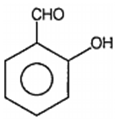 Multiple Choice Questions
Multiple Choice QuestionsThe chemicals used for preparing acetophenone are
(A) C6H6
(B) CH3COCH3
(C) CH3COCl
(D) Anhydrous AlCl3
A, B, C
B, C, D
A, C, D
A, B, D
C.
A, C, D
The chemicals used for the preparation of acetophenone are C6H6, CH3COCl and anhydrous AlCl3.
C6H6 + CH3COCl C6H5COCH3 + HCl
Which one of the following compounds give aspirin on reacting with acetic anhydride in the presence of conc. H2SO4 ?



![]()
The reagent used for converting acetylene to oxalic acid is
HgSO4/ aqueous H2SO4
HgSO4/ CH3COOH
KMnO4/ KOH, 25°C
Cr2O3/ H2SO4
Acid hydrolysis of X yields two different organic compounds. Which one of the following is X?
CH3COOH
CH3CONH2
CH3COOC2H5
(CH3CO)2O
Acetaldehyde forms a white crystalline precipitate on mixing with a ...... solution of ........
acidic, Zn— Hg
alcoholic, Na2SO3
saturated aqueous, NaHSO3
aqueous, NaCl
Which one of the following functional groups undergoes hydrolysis with alkali to yield an acid group?
-CN
-CHO
-COCH3
-Br
Which of the following, compounds is 'the reactant in Rosenmund's reduction?
CH3CO2H
CH3CHO
CH3CH2Cl
CH3COCl
Which of the following reagents can form a hydrazone with alkanone ?
NH3OHCl
PhNHNH2
NH2NHCONH2
HCN
3-hydroxybutanal is formed when (X) reacts with (Y) in dilute (Z) solution. What are X,Y and Z?
